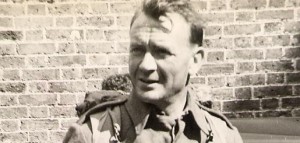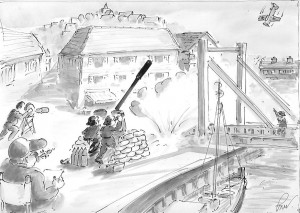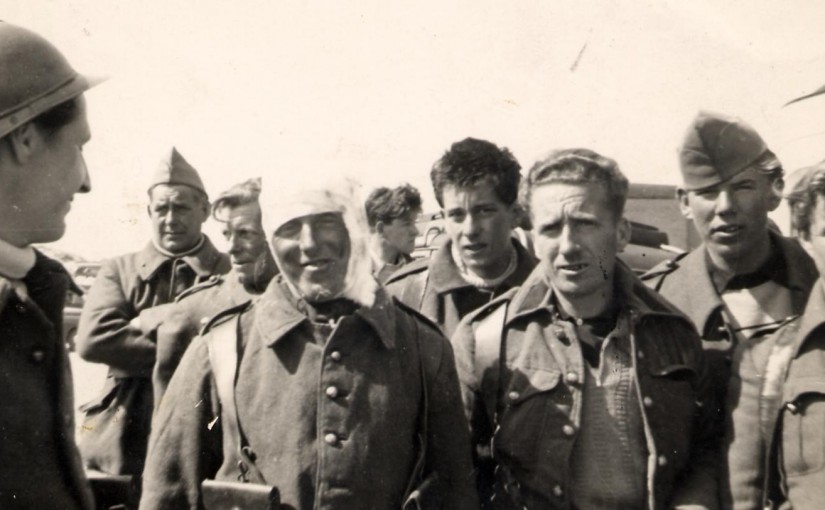TRUE STORIES OF A RYE FAMILY FROM TIMES WHEN THE WORLD WAS YOUNGER
It was early May 1956 and the chimney sweeping season was over. Window cleaning should be the mainstay of ‘the family’ but an unusually wet April had meant there were slim pickings and times were hard.
Father arrived home with news. There was a War Film to be made in Rye – DUNKIRK – and many extras would be needed. At thirty bob a day each it was too good to miss, mother went along with father and Young Jim. They joined the queue at the Drill Hall and were soon signed on.
Mother would be a refugee and the two Jim’s Belgian soldiers. The soldiers were taken to Camber and refugees to Denge Marsh near Dungeness.
The sight that met the boy’s eyes as they topped the sand dunes was amazing. Thousands of regular soldiers had been hired from the War Ministry and they were formed up as far as the eye could see. Huge clouds of black smoke rose into the sky and many small fishing boats lay off the sands with a larger warship beyond. The War had been over for barely ten years and memories were still fresh. Father looked at son and they both stared at the scene in amazement it was as if they had been transported back in time and were actually on the Dunkirk beach at the time of the miraculous evacuation.
They were placed fairly close to the cameras and witnessed the director, Michael Balcon, give his instructions with the use of a loud hailer. It soon struck them that film making was a long job. Preparations went on for hours before the camera took the first shots, then the same scene was retaken time after time until the great man was satisfied.
Lunch was provided by a catering firm employed by the film company and was collected by the stars and extras alike in white cardboard boxes, everyone had the same but the contents were different each day.
On the first evening they arrived home with their thirty shillings each to find mother already there preparing supper. Her story was of an exciting day on the Denge Marsh Road with air simulated attacks by squadrons of Stuka Dive Bombers. Women and children had to dive for cover leaving prams and belongings on the road to be blown up by charges placed on the road by the special effects crew. It was very realistic she told them.
The following day the boys were back at Camber, this time in British uniforms. Charges had been placed in the sand at various places in and around the dunes. They were marked with large blue crosses. “When the attack comes in”, they were told, “Run and dive for cover, but make sure to stay away from the blue crosses”. Keith Colllins, a lad with strong connections to the Rye section of the Salvation Army, thought they said dive on the blue crosses!
“Action” cried Michael Balcon, and they all ran for cover, dodging the spurts in the sand that represented machine gun fire and diving headlong into the sand, well away from the blue crosses, that is, all except Keith Collins. He made straight for the nearest blue mark in the sand and was blown 20 feet into the air, arms and legs flailing, along with a large quantity of cork that represented shrapnel. His body twisted and turned like a rag doll and came down on the sand with a thump. Poor Keith, he was not hurt but very shocked, he did, however, become the only one of over 100 soldier extras from Rye that actually recognised himself in the completed film, his flight through the air added ‘extra’ realism to that scene.
Film making meant an awful lot of hanging about but this was no hardship for the boys from Rye. It was a glorious May, the sun shone every day. They played cards, some losing more than they had earned that day, and generally lay about. Alf Ridges, who was rather hard of hearing, liked to lay on the sand and fall asleep under the soft rays of the May sun. One day he was asleep about thirty feet up a sand dune, on a sort of a ledge. Young Jim, who was a bit bored with the waiting about, was sitting in the sand at the base of that same sand dune when it struck him that if he dug the sand out below Alf and interesting happening may occur. Carefully he carved out a gully, the sand above slowly trickled down and the shelf that Alf Slept on soon began to shrink. By this time there were about ten people aware what was going on and they all waited with baited breath. Alf slept on. At last the shelf beneath him gave way and his nightmare came true, he was falling, in fact he was rolling at ever increasing speed towards the base of the dune. There was a huge roar of laughter and he awoke. He chased Young Jim for almost half a mile before he gave up and saw the funny side.

One of the stars, John Mills, watched as the drama of Alf unfolded. He picked out, and sat with, Young Jim at lunchtime the following day. He wanted to know if Alf was alright after his ‘spin’. Jim told him that Alf Ridges was a tough chap and that he had seen him dive into the river at Rye in the middle of winter to rescue a young lad who slipped in while messing about on the jetty. The tide was running fast and it was touch and go if Alf had the strength to make it back to the bank with the lad. He was brave as well as tough. John Mills was quite impressed.
Thirty bob a day turned into three pounds when the extras got wet above their knees in the queues for the small ships. This was a big bonus and there were others.
Jim Senior was a good swimmer and volunteered for a stunt in the river at The Strand where the film people had taken over the whole area, building a bridge and changing the fronts of the old store houses into French shops.
The bridge was to be blown and the men were supposedly to have been deposited in the river. The five extras were filmed thrashing about in the river, with Jim Snr. holding up one chap most of the time. It was discovered after that this lad couldn’t swim but needed the five pounds that went with the stunt! The shot was never used as it was decided that blowing the bridge in area so close to houses presented too great a risk.303 Rifles were about in great quantities, with masses of blank rounds when the ‘rear-guard’ defended The Strand against the German onslaught.
The two Jims, along with Alf Ridges, Harold Boreham, Colin Coppard and David Britt were positioned behind sandbags on the top story of one of the warehouses. A smoke cylinder was placed at the foot of the wooden stairs which were their only exit. (What would Health & Safety make of that?). The ‘battle’ commenced and the cameras rolled. Hundreds of rounds of blank ammunition was expended, the noise was unbelievable. Some of the men behind the guns had been at the real Dunkirk, it must have brought back memories.

“Cut” cried the Director and the fusillade of rifle shots slowly diminished. The smoke cylinder, which had to this point emitted vast amounts of smoke, suddenly burst into flames, setting the whole staircase on fire. Fortunately the stunt operators were up to their job and immediately had two fire extinguishers in action and the panic was over.
The six weeks that the film crews were around was a boon to Rye. The extras had a great time and were well paid for it. Alas, all good things come to an end and for Jim and his father it was back to window cleaning and chimney sweeping, for a few months more at least.
From Rye’s Own May 2007
All articles, photographs and drawings on this web site are World Copyright Protected. No reproduction for publication without prior arrangement.
